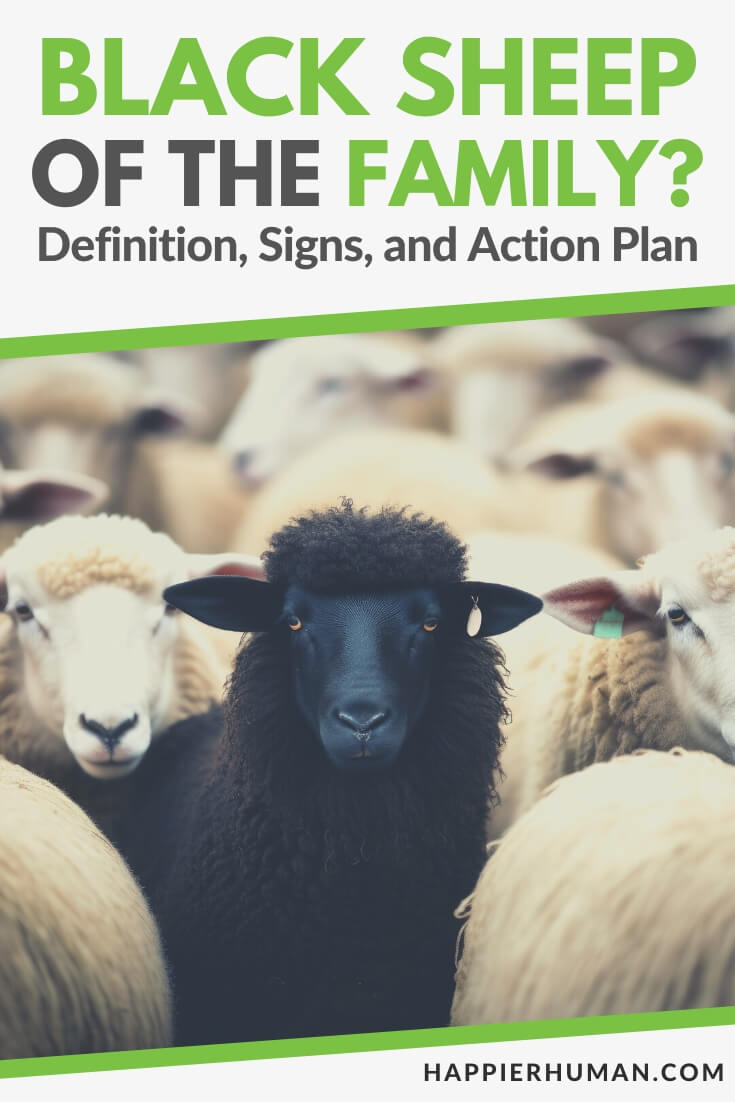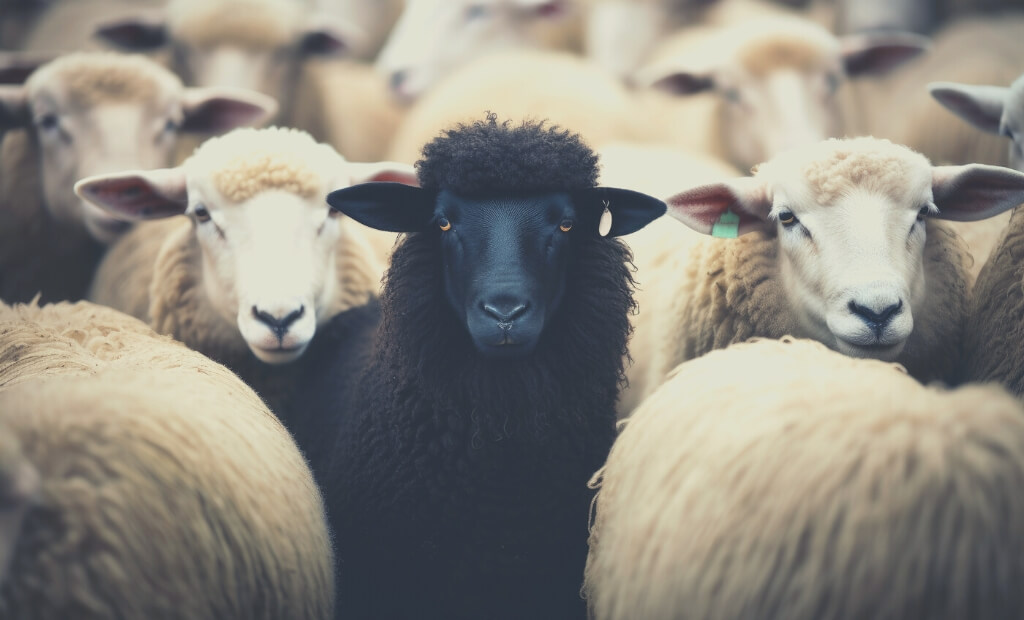Since my earliest childhood, I recall seeing myself as the family black sheep. While Cinderella eventually won her prince’s heart with a glass slipper, most of us black sheep are stuck with a foot in it.
Drama, feeling like you’re an orphan, that you don’t belong, and not feeling valued are all signs of being the black sheep in the family.
Have you been ostracized from your family? Perhaps you hate family gatherings and the awkward “play nice” attitude of the family—often projecting their bullyhood onto you?
The pain of being kicked aside and pushed out of your family herd can cause you to choose to remove yourself from a toxic environment. You may choose to leave the herd of your own accord, but you’ll still be called odd, superior, and even evil.
That is the fate of the lone wolf, scapegoat, and the ugly stepsister. Just what is a black sheep, and how can you learn to deal with being the black sheep in your family herd?
What Is “The Black Sheep of the Family?”
The term “black sheep of the family” refers to a person who is seen as unconventional and eccentric, and a family (like most herds) marginalizes, ostracizes, or excludes the black sheep. However, they may also choose to not associate with their family and voluntarily keep their distance.
Black sheep may also be called the:
In worst case scenarios, they may also be called a criminal, addict, or miscreant.
While the black sheep may be different from the rest of the family in terms of how they look, behave, and their values, interests and beliefs, this person may also be the designated scapegoat who’s always blamed and critiqued.
They are simply treated differently (and usually badly) compared to everyone else, making them feel lonely, hurt, and like they are never (good) enough.
They are never truly part of the family and can often be the family’s punching bag. Most often, the black sheep is simply misunderstood, and no one in the family makes an effort to get to know and understand them.
In systemic family theory, the black sheep (also called marginalized family member) is the identified patient (IP). The theory states that everyone in a family has specific roles (such as the peacemaker or baby), and that of the IP is to be the scapegoat.
Families with an IP place a bulls-eye target on the scapegoat’s back because they use this person as a way to avoid their own struggles, internal pain, and disappointments.
Some families embrace those who are unique. If there is an IP in a family, it says more about the family and their social context than of the black sheep. There are various types of families that have an IP:
Origin of the Term: “Black Sheep of the Family”
Before the term “black sheep of the family” became a negative thing, farmers and shepherds considered it good luck to have one black sheep in a flock.
There are many instances throughout history where the color black has been associated with Satan, negativity, and bad things. In England during the 18th and 19th centuries, black sheep were considered to bear the mark of the devil.
While that notion has been lost in modern times, a black sheep is a name given to those who don’t fit in and seem to have undesirable qualities.
7 Signs You Are the Black Sheep of the Family
If you don’t already suspect, you are the black sheep in the family when you see the following signs:
1. You Forge Your Own Path
In families, parents often want to choose their child’s career, friends, and partners. However, if you chose to follow your heart and have selected a career your parents don’t approve of, or hung out with friends they don’t like, you may be a black sheep.
Maybe you decided to travel and see the world, while your parents and family are all settled within a four-mile radius of home.
If your nature is adventurous you may also be a black sheep if you don’t do as told. Being unafraid of change is also a notable example of why families ostracize black sheep.

Your family may call you reckless and irresponsible, but you know their criticism isn’t merited or reason to cut you out of the family.
Because you walk outside the family fold, you may also have developed a more open mind, which means you think differently than what your family does.
2. Your Outer Appearance Becomes Offensive to the Family
Ever noticed how family members all seem to follow the same type of dress code? It even goes so far as being a case of having similar features, hairstyles, hair and eye color, skin tone, and build.
While genetics does create a similarity in families, you have missed that code completely.
Instead, you are left-handed if everyone else is right-handed. You dress in leather and lace, while the others wear flannel. You put on makeup or grow a beard when the rest of the family has military crew-cuts and think lip-gloss is a sign of a flirt.
Unlike the rest of the family, who blend into the flock, you stand out and draw attention because you have your own look.
3. You Buck Tradition
Conformity isn’t a word you believe in. Unlike the other family meh-mbers, you buck tradition, choosing to practice free thought and personal choice.
For you, growth and development is like air, while they think you have to learn your place in the flock structure.
Interactions with you make them uncomfortable as they have to stretch their limited perceptions to try and see things from your unique perspective. It scares them, so they don’t even try. Instead, they choose to label you as weird, new-age, and eccentric.
While the family dwells in tradition, which is their comfort zone, you like challenges, change, and opportunity. You don’t embrace things that hold you back, including religion.
Chances are that you already snuck out of religion as a child, and as an adult, you may have chosen a different faith or developed your own beliefs, which further sets you outside the family limits.
4. There Are No Similarities
Most families have similar interests. They share hobbies, have similar pursuits, and even clone each other’s goals (“my brother had kids, so I want some too”).
However, you stick out like a sore thumb because none of these things interest you. No matter how hard you try, you just can’t be like your family.
Because you choose your own interests and avoid the conformity of being like your family, you have become “untouchable” and unaffected.
When they try to draw you into pursuits you see as a waste of time or that you know will make you unhappy, you easily pull back and remain vigilant.
As family culture goes, you haven’t so much as sipped on that “Kool Aid.” Oh, you love your family, but you’re not smoking what they’re selling. Instead of being forced into something, you stand your ground and refuse to “do it for the family.”
Your family holds no authority over you, and when your parents insist on something you simply walk away. You are a free spirit and choose to think for yourself. Your family members are strangers you share a genome with.
5. There’s Distance between You and Them
Some families love to stay near each other, and they hang out and socialize like they’re best friends, but you don’t. You aren’t comfortable with your family members, and conversations are awkward.
There’s no closeness or connection between you and your siblings, parents, extended family, or even their spouses.
You forage on your own in life as none of your family members graze near you or have the same tastes as you.
6. You Are the Bad Seed
As the black sheep of the family, you are always the least thought of. Your accomplishments are trivialized, and they expect you to fail at whatever you do.
As you don’t follow the rules, you are often the topic of discussion, and you never benefit from the family, since you’re also the “lost sheep.”

Your parents may spoil your siblings with costly gifts while you barely receive any notice.
They reward what they see as good in your siblings, while you are a failure in their books, so they withhold commitment and love.
7. You Are Last
Another sure sign you are the black sheep in the family is that you are last in everything. If your family plans a gathering, your invitation is sent out last (or perhaps, not at all). Should they plan a family get-away, you are left out.
They don’t consult you on any matters of the family, and you are an afterthought in their minds. Even if you are successful, they still don’t see you as leading the family. Instead, they may make up excuses for your success, trying to strip it away so you can end last.
How to Deal with Being a Black Sheep: An Action Plan
Being the black sheep in the family, whether your family has openly treated you as the scapegoat or whether you just don’t fit in with your family, isn’t easy.
You’re like the ugly stepsister and lone wolf, designated to walk through life alone and without those who are supposed to love and support you.
Follow these steps to help you deal with being the black sheep of the family:
Step 1: Identify Whether You Are Truly the Black Sheep
You need to take a step back and objectively evaluate whether you are indeed the black sheep. Ask yourself:
It’s a good idea to journal about questions to figure out how you’ve been bothered. Once you are sure you are the black sheep and not just projecting, you can move onto step 2.
Step 2: Understand You Aren’t to Blame
It’s essential to fully understand that you are not to blame for your family’s dysfunction and being the designated black sheep.
Your family bullying, blaming, and misunderstanding you speaks volumes about who they are, and you need to beware how unhealthy and toxic these people are for your mental health.
Sure, you aren’t perfect, but they aren’t either. And your family are the people who are supposed to be there for you and love you unconditionally.
If you were or are the IP in your family, how they treated you comes from their own repressed traumas, anger, frustration, stressors, fears, and insecurities.
You ARE NOT to blame. So let go of your guilt.
Step 3: Reframe How You View Being the Black Sheep of the Family
Now that you understand that you are not to blame for being the family’s black sheep, reframe your thoughts. You aren’t a scared, helpless child anymore; you are an adult who’s resilient and who has resources at your disposal.
You don’t need your family’s approval, support, or love because you can provide those things for yourself. You aren’t the black sheep they’ve always thought you to be.
Do this mental rehearsal or reframing exercise:
Imagine your family in a room (yourself included), but you take a zoomed-out look at yourself.
Ask yourself what you’ve done that makes you different from your family? What have you achieved in your life thus far? What are your values?
Now, think about the people who are in your life now who love and support you. What do they love and value about you?

It’s time to reimagine yourself as a kind, resilient, and proud person in the room with your family. You are merely a visitor now as you acknowledge that you aren’t like them and that there is nothing wrong with you.
You never deserved to be the scapegoat, and your family cannot take away who you are or the healthy people in your life who love you.
Step 4: Set Boundaries
Reinforce the reframing with your boundaries. Decide:
Identify your safe or comfort zone so you know when to extract yourself from toxic situations.
Step 5: Take Positive Steps Forward
Once you have your boundaries in place, and they are something you need to continuously enforce, you can:
1. Soul search
Being the scapegoat can be a gift and a curse but do some soul searching and turn inwards. Embrace being the black sheep and find your own unique journey where you don’t have to live up to your family’s expectations.
2. Learn to love yourself
Practice self-kindness, self-compassion, and self-love (and cut yourself some slack).
3. Heal your wounded inner child
It’s important to heal from the trauma of being the black sheep, so it’s time to embrace, nurture, and love your wounded inner child.
4. Mourn what might’ve been
Deal with being the black sleep by mourning what might’ve been. What if scenarios (e.g. what if my family loved and accepted me?) may plague your mind, but you can’t rewrite the past. Let go of what was, use the lessons you learned, and look to the future.
5. Find your own soul family
The people who made you into a scapegoat aren’t your family. They are your relatives.
It’s time to surround yourself with healthy people and find your soul family who will love and accept you – flaws and all.
Final Thoughts About the Black Sheep of the Family
You may only now be fully aware of being the black sheep of the family. It’s not your fault, you didn’t deserve it, and you have options.
You can choose to embrace your authentic self and simply continue living with genuine passion amid the sheep until they chase you out, or you can choose to leave the flock and live a full life on your own.
The final choice is not one to be encouraged, which is to hide in the family, trying to fit in, appease the sheep, and belong.
Accept you will never belong with the “white” sheep. But let’s face it, you may need to admit there are warning signs your family is dysfunctional.
And if you are looking for more articles about family, be sure to check out these blog posts:
- 21 Prayers for Your FAMILY During Difficult Times
- 7 Obvious Signs You're a Family Oriented Person
- 45 Toxic Family Quotes to Heal & Let Go of Your Pain


